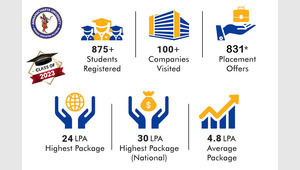Department
Computer Science and Engineering (Internet of Things and Cyber Security including Block Chain Technology)
NSS
The Main Objectives of the National Service Scheme are:
- To enable the students to understand the community in which they work;
- To understand themselves in relation to their community;
- To identify the needs and problems of the community and involve them in the problem-solving process;
- To develop among themselves a sense of social and civic responsibility;
- To utilize their knowledge in finding practical solutions to individual and community problems;
- To develop competence required for group-living and sharing of responsibilities;
- To Gain skills in mobilizing community participation;
- To acquire leadership qualities and democratic attitude;
- To develop the capacity to meet emergencies and national disasters;
- To practice national integration and social harmony.
The Motto of NSS “Not Me, But You”, reflects the essence of democratic living and upholds the need for self-less service. NSS helps the students develop an appreciation of other person’s point of view and also show consideration to ‘/other living beings. The philosophy of the NSS is well doctrine in this motto, which underlines/on the belief that the welfare .of an individual is ultimately dependent on the welfare of the society on the whole and therefore, the NSS volunteers shall strive for the well-being of the society.
NSS was formally launched on 24th September 1969, the birth centenary year of the Father of the Nation. Therefore, 24 September is celebrated every year as NSS Day with appropriate programmes and activities.
Proposed Activities
- Identification of the adopted villages/slum areas
- Awareness drives through youth rallies, street plays, exhibition, skits highlighting success stories by way of traditional folk art and media
- Community participation by involving member of the adopted villages and local institutions
- Duration of the NSS special camps will be 7 days and the volunteers will have to stay overnight in the camp.
- Organizing day camps on the theme at the adopted villages on the weekends
- Renewable Energy awareness programmes
- Technological training for self-help groups and rural youths
- Traffic control during festival occasions
- Collection of clothes for distribution to the people below poverty line
- Visits to orphanages/Old age homes/ Blind schools and feeding
- Creation of awareness of Rain Water Harvesting
- Mass tree plantation(one student one tree)
- Organizing veterinary camp.





